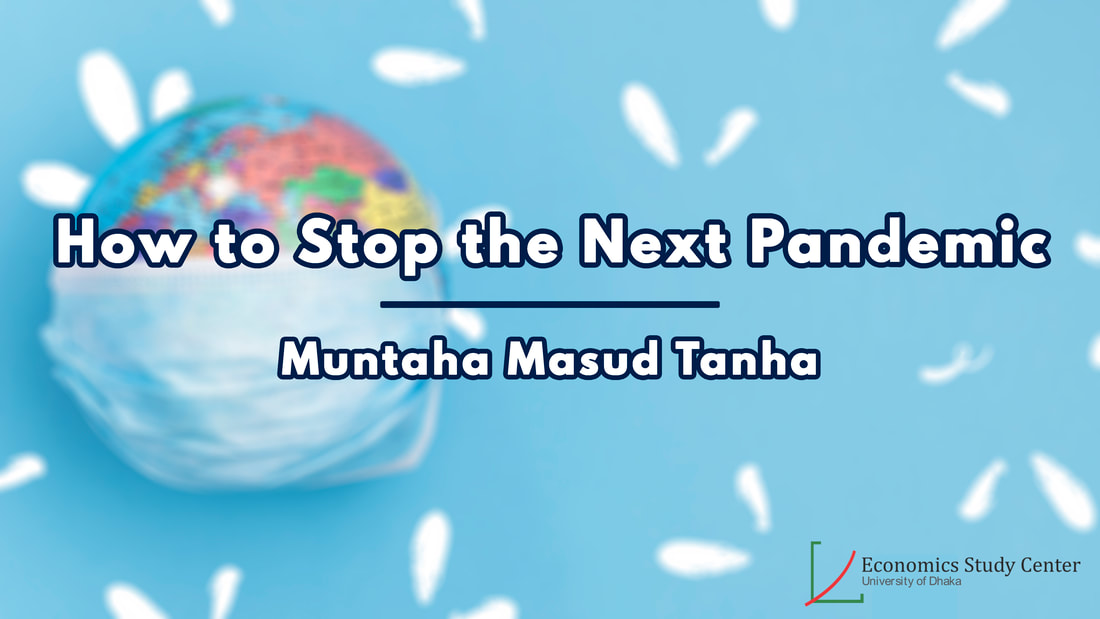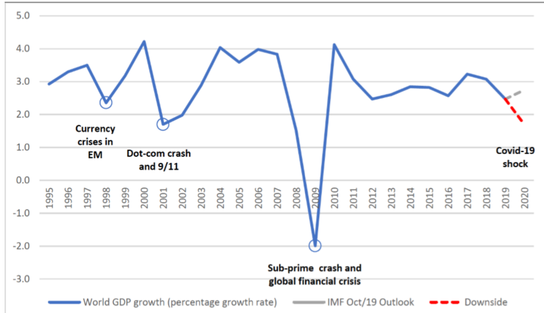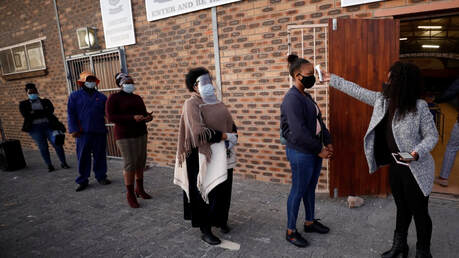ECONOMICS STUDY CENTER, UNIVERSITY OF DHAKA
|
Muntaha Masud Tanha “Pandemic” refers to a fatal communicable disease which causes “hierarchy of deaths” and severe economic detriment over a wide range of areas across the boundaries over a long period of time. According to the World Health Organization (WHO), “A pandemic is an epidemic of worldwide proportions; a global disease outbreak. It is determined by how the disease spreads, not how many deaths it causes”. This world has been facing several pandemics since its birth. Research shows that the world has experienced a pandemic in every 100 years. More or less, every pandemic has its own level of destruction. This level is somewhat contingent on the frequency of pandemic. So, whether the economy is in a V-shape or W-shape recession during the pandemic is to be decided by the waves of it. According to a recent analysis, there have been 10 pandemics of influenza in the past 300 years. It also shows that the pandemic of 1918 and 1919 killed 50 million to 100 million of people. Though that pandemic is often considered anomalous, the pandemic of 1830 through 1832 was much severe. The world population is now 6.5 billion. So, with this huge population, the recovery from any pandemic attack will be a pure risk. Therefore, we have to take necessary steps accordingly to create necessary obstructions for any pandemic to come and blocking the pandemic occurrence in order to maintain a risk-averse situation from all sort of losses. Types of pandemic Different types of pandemic have occurred till date. Among them, most notable are Chikonguniya, Cholera, haemorrhagic fever, Ebola virus, Hendra virus, Influenza, Lassa fever, Marburg virus, Meningitis, MERS-CoV, Monkeypox, Nipah virus infection, Plague, Rift valley fever, SARS, Smallpox, Tularaemia, Yellow fever, Zika Virus, Novel coronavirus (2019-nCoV). Losses due to pandemic Due to pandemic, a country faces a macro level loss followed by its micro level. Huge number of people remain unemployed for a long period of time which affects the country’s Gross Domestic Product (GDP) and Gross National Product (GNP). Besides, a countable number of death tolls leaves many countries to suffer from lack of productiveness and demographic dividend in many cases also steps backward. All these circumstances eventually lead a country into recession which, for many underdeveloped and developing countries, is a nightmare. Three important lessons from 1918 pandemic a) Assuming the pandemic would repeat: To assume that, any similar type of pandemic may repeat and to take measures accordingly. b) Preparation for a potential pandemic: To take necessary precautions and set strong metabolisms to be able to fight any bigger pandemic. c) Nations have to fight together: It's time to reverberate the quote, “United we stand, divided we fall”. Nations need to fight together unitedly in order to tackle any future pandemic. Any war or rivalry within the nation may create hindrance to overcome future pandemic. Ways to stop a pandemic 1. Report cases early: All the cases related to the pandemic need to be reported earlier. It would help making the predictions more clear and will also help to take more precise decisions. 2. Alert the world: Population all over the world must be cautious for any future pandemic. They should know how to take precautionary steps as the saying goes- “Precaution is better than cure”. 3. Promote international scientific collaboration: In order to know the frequency of any future pandemic, we need to rely upon research. Research is done with a view to predict future probabilities. A pandemic should likely be guessed through research work and scientific innovations. 4. Provide leadership and consistency: To accomplish any success, to be followed by a certain leadership and to be able to maintain consistency is a privilege. The same applies for a pandemic. Under proper guidance and consistency, it is possible to get rid of any further pandemic. 5. Avoid speculation: Many of us have the general tendency to speculate things. We are indifferent also when it comes for pandemic. We start believing things will be worst at bad times and will be best at good times. It's high time we should erase this belief from us as it may bring huge loss for us in the long run. 6. Provide safety guidelines: Every workers and outsiders should be provided with necessary safety guidelines so that they can remain safe and can ensure our safety as well. 7. Institute travel limitations and screening: Every institution should limit their visiting hours. We all know that crowded and messy places are the love places for any pandemic to spread further. The more we avoid such places, the better. 8. Implement early consistency support containment: Early support should be provided to the underprivileged and less privileged so that they can also survive through the pandemic without stepping outside. 9. Testing: Testing is indeed a timely action to be taken. It can prevent spreading a lot resulting in a lesser loss. 10. Aggressive contract training: Aggressive contract training will help people more experienced to handle any pandemic if happens. They will tackle it with more excellency if such contract trainings are provided to them. 11. Stockpile necessary medications and equipment: It is necessary to keep some medications and equipment for any crisis that may take place. As, during crisis, the purchasing power goes down causing many people to suffer. 12. Bolster national healthcare instructions: It is necessary to strengthen the healthcare instructions properly in order to make sure all the people are maintaining strict health rules helping to maintain proper hygiene. 13. Protect healthcare workers: Healthcare system should be under proper monitoring system and every worker should be provided with health safety. 14. Do just in-time professional education: Proper sense of education and knowledge can reduce the harm done by a pandemic by a lot. So it's importance is immense. 15. Prepare the public: The mass public should be prepared for any pandemic by giving proper trainings and should have the capability to reduce the vulnerability by any pandemic. 16. WHO’s proposal a) Integration of pandemic preparedness into national emergency preparedness plans, frameworks and activities. b) Use of pandemic preparedness activities to strengthen to basic and emergency health related capacities. c) Use of preparedness activities to actively build communication channels between sectors and communities. d) Development or modification of business continuity plans specifically tailored to business. e) Periodic reassessment and updating of current plans based on new developments and information gained from exercises. 17. Government’s responsibility: a) Identify, appoint and lead coordinating body for pandemic preparedness and control. b) Prioritize and guide the allocation and targeting of resources to achieve the goals as outlined in a country’s pandemic c) Provide additional resources for national pandemic preparedness, capacity development and response measures d) Consider providing resources and technical assistance to countries experiencing outbreaks with pandemic potential 18. Health sector: a) Providing reliable information on the risk, severity, and progression of a pandemic and the effectiveness of interventions used during a pandemic. b) Prioritize and continue the provision of healthcare during a pandemic. c) Enact steps to reduce the spread of pandemic in the community. d) Protect and support health care workers during a pandemic. 19. Non-health sectors: a) Establish continuity policies to be implemented during a pandemic. b) Plan for the likely impact on business, essential services, educational institutions and other organizations. d) Develop capacity and plan for pandemic response. e) Plan the allocation of resources to protect employees and workers. f) Communicate with other educated employees on how to protect themselves on a pandemic and that to be implemented. g) Contribute to cross cutting planning and response efforts to support the continued functioning of the society. 20. Communities, Individuals and Families:
21. Coordination under International Health Regulations: Coordination and cooperation has to be done for reducing the harmfulness. A hand for hand can reduce the damage a lot in this case. If everyone remains aware, then the speed of pandemic will reduce and end one day. 22. Switching to pandemic vaccine production: Vaccines should be produced and updated to fight through the pandemics. Ideal vaccines should be produced and provided to the people, specially children so that they doesn’t get affected. 23. Providing an early assessment of pandemic severity on health: When people can know about the severity of pandemic, they themselves will remain aware of it more. None wants to suffer from diseases for a long time. So, knowing the severity, all will be able to take necessary steps to overcome through the pandemic. 24. Prioritizing the use of antivirals, vaccines and other medical interventions: The use of medical interventions is to be done properly in a perfect manner so that it becomes ready to wave back any pandemic flow. 25. Managing continuity of health care: Whether the healthcare systems are providing proper facilities and continuing them regularly or not is to be checked properly. It increases the probability of giving proper services to people and helps making them well off during the pandemic. 26. Communicating with the media and the public and answering queries: Communication is indeed very important. It increases the possible way out of the problems and decreases instant decision making which might, at many times can cause wrong decision making and meaningless panic. 27. Recommended actions before, during and after a pandemic:
28. Affected countries: Identify the needs first about which is needed by the affected people and fulfilling the needs accordingly and activate them. Countries not yet affected need to finalize preparations for a possible pandemic and respond. If possible, they should request for international assistance organized by WHO. 29. Forecasting fallacy: Forecasting fallacy will include how much time will be needed to complete a future task and so on. This will help to make the decision making more strong and vivid. 30. Non-pharmaceutical measures:
Protecting environment and ecological balance It has been seen from research that most of the pandemics originate from animals. Animals, being in lack of biodiversity, increases the possibility of interacting more with human. And as a result of this interaction, the virus of animals passes to humans giving rise to a pandemic. So, protecting biodiversity and maintaining its balance followed by protection of environment is needed to be ensured without any delay. We are living in an era of global pandemics. Due to it, many of our lives are hampered in many ways. Many of us are deprived from basic human rights. So, to get into this fact has become an overdue already. Therefore, steps should be taken to stop this pandemic right now. We all should hope and try for a better world together where there would be no such monotony.
0 Comments
Leave a Reply. |
Send your articles to: |





